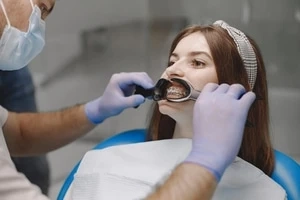Oral health is vital for the maintenance of a healthy lifestyle. Good oral hygiene means keeping your mouth disease-free. It is crucial to maintain good hygiene practices, such as regular brushing and flossing, to achieve that goal.
However, even with diligent cleaning of the oral cavity every day, bacterial growth may be present in the mouth, because bacterial growth depends on other factors as well. So it is important to get professional dental cleanings done at the dental office.
Consequences of Bacterial Growth in the Mouth:
If you have a bad breath regardless of brushing twice daily, it might be an indication of bacterial growth in the cavity. The most common reason for the bacterial accumulation is plaque. It must be removed from the mouth because it solidifies over time and sticks to the surface of the tooth as tartar, which is called calculus. Therefore, Dentist New Prague MN recommend regular professional cleanings after 6 months.
Plaque:
It is a biofilm that coats the tooth surface. It is not removed by rinsing. It is the house of bacteria that releases destructive acids harmful to teeth. The plaque fosters different bacterial colonies that destroy the tooth structure.
Calculus:
Plaque slowly solidifies and turns into calculus. The plaque, when not removed, mineralizes and hardens around the tooth.
Gingivitis:
The bacterial accumulation leads to gingivitis, which is a gum disease resulting in swollen, red gums. The common symptom of gingivitis is bleeding while brushing or on slight provocation.
Periodontitis:
It is the infection of periodontal tissue which destroys the bone. It is the sequel of gingivitis and is a more aggressive form. If left untreated, periodontal disease can cause rapid destruction of the bone that may result in the loosening of teeth, and eventually teeth might fall out.
These events can be prevented by getting the plaque removed with the help of professional tools at the right time.
Other Factors that Lead to Plaque Buildup:
Malocclusion:
Crowded teeth pose problems when it comes to cleaning. Brushes do not reach in crowded areas, sparing the room for plaque buildup. Patients with these issues need professional cleaning to reach those stubborn areas.
Genetic Predilection:
Some diseases such as Aggressive Periodontitis, which is also called juvenile periodontitis, affect the bone even with good hygiene practices. It is a hereditary condition that requires periodontal treatments timely.
Deteriorating Oral Habits:
lHabits like smoking and tobacco chewing, affect the oral cavity in a very destructive manner. Tobacco chewing causes stain accumulation on the teeth, turning them brown. Smoking causes constriction of blood vessels in the gingiva, which prohibits the bleeding gums but adds to the gingivitis and bone loss.
Psychological Disorders:
Patients with special needs or emotional distress cannot manage the hygiene on their own and require assistance. Due to negligence, the bacterial load increases, which leads to gum diseases and tooth decay. Therefore, dental cleanings are necessary to contain degrading oral health.
Traumas or Injuries:
Due to a traumatic experience, cleaning the mouth can be a daunting task and hence hygiene is not maintained. Poor oral hygiene eventually leads to calculus buildup, ultimately damaging the bone.
Types of Professional Cleanings:
Prophylactic Cleaning:
This procedure is a preventive approach and is done even in the absence of any clinical signs of the disease. The gums are healthy, however, the removal of plaque biofilm is done with the help of ultrasonic scalers, which can be followed by polishing.
Full Mouth Debridement:
The complete ultrasonic scaling is done where the calculus deposits and stains are in huge amounts. Pocket formation is present usually in such cases.
Curettage and Root Planing:
This is recommended in cases with excessive calculus buildup even in the subgingival areas. In such cases, scaling is not sufficient and curettes are used for deep root area cleaning with pocket cleaning.
Deep cleaning of pockets is also done with laser therapy
Conclusion:
At-home care is the most crucial step when it comes to the prevention of diseases. Apart from brushing, flossing and use of mouthwashes are also important to reduce plaque buildup. Pairing home care with dental treatment ensures the complete elimination of diseases and other dental concerns.
Visiting your dentist regularly should be a mandatory part of your health regime.



